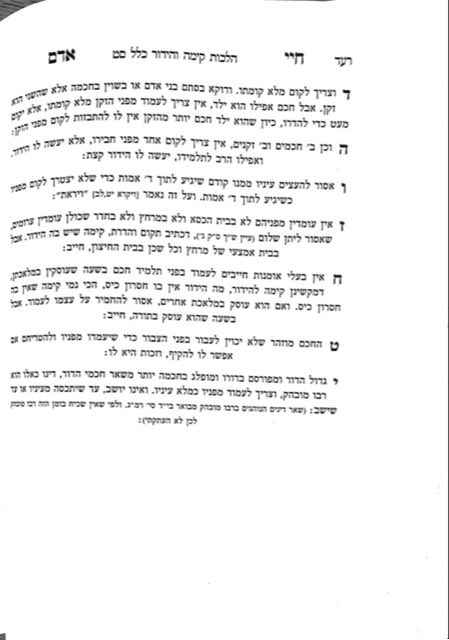We are discussing the halachos of kavod talmidei chachamim, specifically the halachos of hiddur. Rashi in Chumash quotes the Toras Kohanim, which says that one should not be soseir (lit. break down) the words of a talmid chacham. Soseir can mean a few things. If a person needs to correct or challenge a talmid chacham, they cannot simply say that the talmid chacham is wrong. Rather, they should place the lack of understanding upon themselves, by asking that they do not seem to understand what the chacham is saying. The Chazon Ish asks in a letter how we find many seforim which come to argue on earlier talmidei chachamim. He explains that it is muttar because they do so in a respectful and humble manner, in which they do not bluntly state that the earlier chacham is wrong, but rather preface the argument with phrases such as “in my humble understanding” and so on.
The halacha is that if one chacham paskens something is assur, another chacham cannot pasken it is muttar. One of the reasons for this halacha is to maintain proper kavod for the first talmid chacham. (The other reason is because of the concept of shavya anafshei chaticha d’isura, that once the first chacham has paskened assur, it creates a halachic reality in which the item is assur.) There are obviously scenarios where this does not apply, such as if the second chacham is informed of the psak and reasoning of the first chacham and finds a mistake in the first chacham’s thought process. But we must understand that one cannot simply go “chacham shopping” and be soseir the words of the first chacham.
We mentioned (shiur 1493) that the chacham should enter first. The Gemara in Shvuos says that if multiple people are waiting in beis din to have their cases adjudicated, there is a mitzvah to allow the chacham to have his case judged first. The halacha extrapolates to any situation in which a chacham is waiting for a turn for something that a chacham should go first, both out of kavod and to try to minimize his bitul torah.
The Gemara asks that to allow a chacham to go first in a din torah would appear to be inappropriate, because the Torah clearly states kakaton kagadol tishmaun (Devarim 1:17), that one cannot choose which dinei Torah to adjudicate based on the amount of money involved, the litigants, or any other factors. The Gemara answers that kavod hatorah still takes precedence. From here we see how seriously Chazal take Kavod haTorah of a chacham. Thus, for example, if one sees a chacham waiting in a checkout line, it is a mitzvas asei to allow the chacham to go first.
If the supply is limited, and by allowing the chacham to go first the other person may not receive supply, there is still a mitzvah to let the chacham go first. Obviously, if it is a question of sakanas nefashos (e.g., medicine) one is not chayav to let the chacham go first, but in the average scenario allowing the chacham to go first would still apply.
Summary
One should not be soseir the words of a talmid chacham. This includes:
- Not challenging them outright, but respectfully asking for clarification;
- Not going “chacham shopping” when receiving a psak;
A chacham should be allowed to go first, both out of kavod and to minimize bitul torah. This includes:
- Allowing them to enter a room first;
- Allowing their case to be adjudicated first;
- Allowing them to go first in any line, even if one risks losing their turn or share (unless it is pikuach nefesh).



